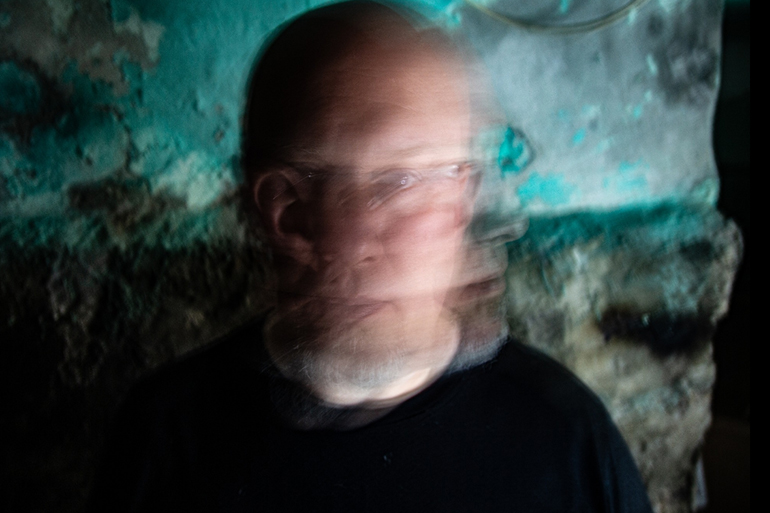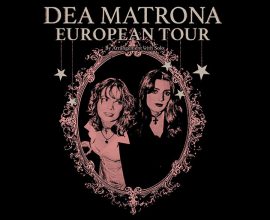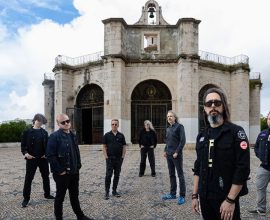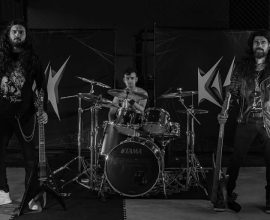Assemblage 23: “This album is about how we deal with the chaos around us”
With Null, Assemblage 23 celebrates its tenth album, returning after a hiatus since Mourn with a work that reflects both the external world and the inner struggles of the human experience. Tom Shear explores how we cope with the chaos around us, combining introspective lyrics with a dense production and extensive use of hardware synthesizers, resulting in a sound that is both emotionally intense and danceable.
By Sandra Pinto
The album arrives at a time when the world is facing social, political, and mental health crises, and many of the tracks address these issues directly. Despite the weight of the themes, the live shows remain a celebration of energy and connection with the audience, where vulnerability and dance coexist. For Shear, the creative process is essential, almost therapeutic, and Null reaffirms his unwavering motivation to continue making meaningful music while staying true to his voice within the Future Pop and electro-industrial scene.
’Null’ marks your tenth album as Assemblage 23. What kind of emotions or messages did you want to explore this time around, especially after the hiatus since Mourn?
I aimed to cover a lot of territory with “Null”, but I think overall, a lot of the tracks deal with the current state of the world and how we, as human beings, deal with the chaos that surrounds us. So, it’s sort of an intersection between the inward-looking themes of previous albums, but linking that with looking outward at a world that seems to be on fire.
Singles like ‘Tolerate’ and ‘Believe’ already offer a glimpse into the sound of the new record. What musical or thematic directions did you choose to dive deeper into on Null?
This is probably the happiest I’ve ever felt about how an album came out. Part of the reason I decided not to release a deluxe edition this time is that I wanted to put everything I’ve got into making these ten tracks the best I possibly could. Overall, I used a lot more hardware synths on this album. When I did Mourn, I was living in a very small apartment and didn’t have room in the space I was using as a studio to utilize much of the hardware, but now that I’m in a much larger space, I was finally able to wire everything up and make use of it much more easily. I think the production is quite dense-sounding.
Your music has always stood out for its emotional weight and vulnerability. How do you balance that personal honesty with the danceable nature of your sound?
While it might not seem expected to have danceable music also be meaningful, I think it’s actually the perfect vehicle for delivering those kinds of messages. If the music can pull in the listener with a hook or a catchy beat, you’ve got their attention and can draw them into the deeper meaning of the lyrics. I’ll admit that it’s not a very common combination, but I think it’s an effective one.
Since the release of Contempt in the early 2000s, the Future Pop scene has evolved quite a bit. How do you see the current state of the genre and your role in it today?
I’m probably a bad person to ask, as I am pretty out of touch with the current state of the scene. I don’t think it’s as common a style as it used to be, and outside of a handful of bands, I think it’s mostly still made up of us old-timers. I’d say the style is about due for a resurrgence, though.
Most of the major acts in the electro-industrial/Future Pop scene in the 2000s were European. What was it like for you to establish yourself as an American voice in that space?
I was always sort of out of step with what was going on in the US market. It took me about 10 years of sending demos out in the US before I got any traction, and even then, it was originally with a Canadian label (Gashed Records). I’ve always been into the more electronic side of things, but when I was trying to get label interest, most of what was being signed in the US were the industrial metal acts like 16 Volt, etc. Things finally started to shift away from that in the late 90’s and that happened to be the time I was finally able to get a label to take a chance on me.
’Null’ will be released during a new UK tour. What can fans expect from the live shows — both in terms of setlist and energy?
The album is actually coming out a couple weeks after the end of the tour, which we just completed. We always try to deliver an energetic and fun show and are very conscious of the fact that there are certain songs the fans want to hear, so we try to deliver. It always sucks when you go to see a band that has been around for a long time and they only play new material, so we try to give the fans what they want while also introducing them to the newer stuff. The setlist got a great reaction on the tour and we had a blast.
You often tackle difficult topics like depression and suicide in your lyrics. How does your creative process help you deal with these experiences?
I often liken it to going to therapy, but instead of laying in a couch and talking to a therapist, I get to do it on a stage. It’s really gratifying to be able to not only sort of exorcise whatever demons are weighing heavy on me, but to get to do it with a room full of people who can relate to what I’m talking about. I often wonder how people without a creative outlet manage their personal issues. I feel very lucky to be able to get this stuff out via a song.
The world has changed significantly since your last album in 2020 — pandemic, social polarization, mental health crises. Did any of that shape the new songs?
Absolutely. Probably more so than any of previous albums. I find it kind of surprising just how little music I’ve heard coming out of this scene that addresses the madness the world is experiencing right now. Where is the spirit of punk? Where is the pushing back against authority? Where is the speaking out against injustice? I hope more artists will come forward and take a stand. Silence is just complicity.
With 10 albums under your belt, what still motivates you to keep creating music as Assemblage 23? Is there anything you feel you haven’t said musically yet?
In a way, that’s sort of like asking me why, after all these years, I still breathe oxygen. Music is just a part of who I am and I can’t imagine my life without it. It’s almost an addiction in that I feel very uncomfortable if I don’t have time to do creative things. It’s something I will do until the day I die whether anyone is still listening or not.
Looking back to the start of your career, what advice would you give to the younger Tom Shear who was just about to release Contempt?
“Keep going.” I think what derails more aspiring bands than anything else is giving up. Persistence is key.





